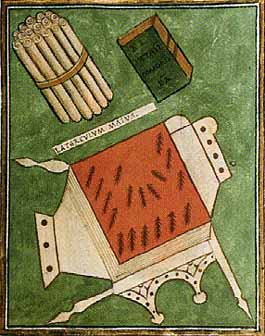Primicerius facts for kids
The word primicerius (say: prim-ih-SEER-ee-us) comes from Latin. It was a special title used in the later Roman Empire and the Byzantine Empire. A primicerius was usually the boss or head of a department or a group of people. The Church also used this title for leaders of different groups.
The word itself means "first on the wax tablet." This is because the name of the most important person in a group was often written first on a wax tablet, which was like an old-fashioned notebook.
Contents
What Was a Primicerius?
Primicerius in Government and Army
From early times, there were many different primicerii in the Roman and Byzantine empires. They worked in the emperor's court and in the army.
In the Emperor's Court
One important primicerius was the primicerius sacri cubiculi. This person was in charge of the emperor's bedroom. They were almost always a eunuch, which means a man who could not have children. This job was very close to the emperor.
Other primicerii helped the emperor with other important tasks. For example, some managed the emperor's special money (called the eidikon). Others looked after the emperor's clothes and belongings (called the vestiarion). Some primicerii also led different government offices, like the one for official scribes or secretaries (called notarii).
In the Roman and Byzantine Armies
In the Late Roman army, a primicerius was a military rank. It was higher than a senator but lower than a tribunus. These officers were often found in units that protected the emperor.
For example, in the 4th to 6th centuries, there were primicerii in charge of the emperor's bodyguards. These included the protectores domestici and the Scholae Palatinae. There were also primicerii who managed the factories that made weapons. These factories were under the control of a high official called the magister officiorum.
Later, in the Byzantine Empire, during the time of the Komnenian emperors, primikērioi became commanders. They led special palace regiments. These included groups like the Manglabitai, Vardariōtai, and the famous Varangians.
The Grand Primicerius
Around the late 11th century, a new, very important title was created: the megas prim[m]ikērios (Grand Primicerius). This person held a very high position in the emperor's court. They were often in charge of important ceremonies and events. Prim[m]ikērioi continued to be important in the Byzantine Empire until it fell to the Ottomans.
Primicerius in the Church

The title primicerius was also used in the Christian Church.
Early Church Roles
In the early days of the Roman Catholic Church, the title was given to the heads of groups of scribes (Notarii) and legal defenders (Defensores). These groups played a big part in how the Church was run.
When young church students were gathered in schools for training, the leaders of these schools were also called primicerius. For example, an old writing from the year 551 mentions a "Stephen, primicerius of the school of readers serving in the church of Lyon." These leaders also had some power over how church services were performed.
Over time, the primicerius became a special leader in many churches. They were often in charge of the lower-ranking clergy and helped direct church songs and services.
In the Eastern Orthodox Church
In the Eastern Orthodox Church, the title was used for the heads of scribes and clerks in the Church's administration. It was also used for the main readers and singers in a church.
Modern Use in Russia
Today, in the Russian Orthodox Church, the word primicerius (or primikirii) is used for a junior church helper. This person might be a reader or a subdeacon. They usually carry a torch or candle in front of a bishop during church services. They often walk at the front of processions, which might be why this word was chosen.
 | Dorothy Vaughan |
 | Charles Henry Turner |
 | Hildrus Poindexter |
 | Henry Cecil McBay |


